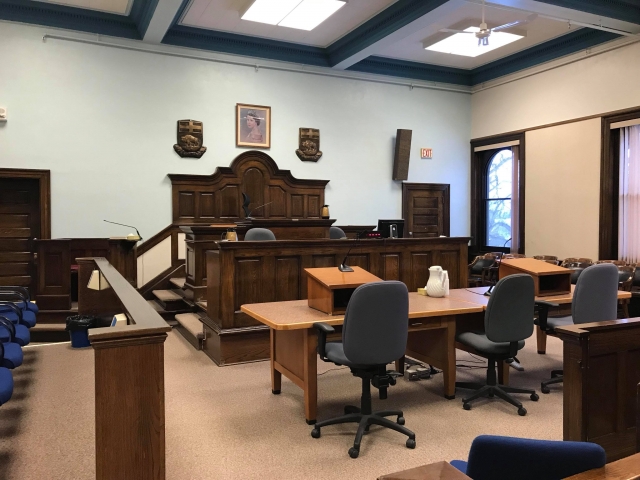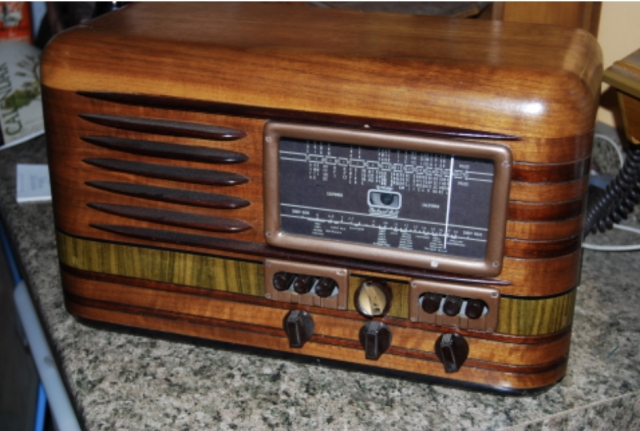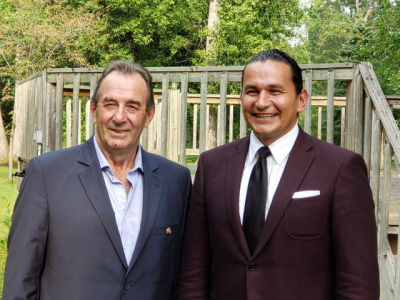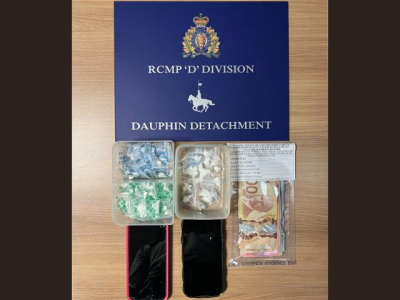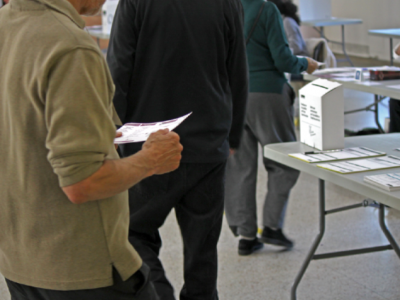 NewsNow
NewsNow
The Manitoba government is introducing new legislation that would streamline the sale of Crown Lands.
Central Services Minister Reg Helwer said that the Crown Land Dispositions Act will make the overall process of land dispositions more efficient, effective and transparent.
“Manitobans who want to purchase surplus Crown land for economic or recreational purposes would see shorter wait times and quicker response times from the province on routine real estate transactions.”
Helwer added that a review in 2018 concluded that the province's land sales process was overly complex and costly. The new legislation aims to help reorganize the system, establish new processes and develop a more efficient governance model.
The proposed changes would give more authority to ministers to make land sales decisions. As it stands right now, all sales above $25,000 require cabinet approval as well as one statute of $500.
Under the new structure, a department minster could sell Crown land and property valued up to $200,000, the minister of finance could authorize sales between $200,000 and $1 million, and cabinet approval would be required on sales of $1 million and over.
Helwer added that the new protocol will reduce the number of transactions that require cabinet approval and speed up the process for land sales.
“Safeguards would be in place to ensure all land sales are open and transparent and free of inside influence.
Minister would review sales to employees perceived to have any influence on the decision, while the cabinet would approve sales to ministers and senior public servants.
More information on land sales or acquisitions can be found here.
- Details
- Contributed by Josh Sigurdson
The Government of Manitoba has introduced legislation that would allow liquor to be sold with take-out orders and through delivery meal services.
Crown Services Minister Jeff Wharton said that many restaurant owners have expressed interest in selling wine, beer, and single-serve beverages through take-out or delivery services.
“This is a win-win for businesses and customers as restaurants will now be able to expand their business and offer an additional service to customers.”
Liquor delivery and take-out orders would be linked to meal orders and offered by licensed restaurants. The liquor would cost the same as an in-dining service.
The changes would also consider social responsibility in serving alcohol. Drivers delivering alcohol will have to be 18 or older, be certified by the LGCCA’s Smart Choices responsible sales and service program, and conduct mandatory I.D. checks.
Wharton also noted that several private wine stores have indicated that they see this as an opportunity to sell more wine to their corporate restaurant customers, which will support their economic viability.
The proposed legislation would also change the Manitoba Liquor and Lotteries Corporation Act to remove the current reference to “beer’ under the distributor section, which limits distribution for private distributors and change it to “beverage alcohol categories.” The change will allow third parties to dispense a wider range of products to vendors.
Wharton added that this is a step to reduce red tape and to provide Manitobans with more choice and convenience, and create greater opportunities and flexibility for businesses.
- Details
- Contributed by Josh Sigurdson
Drivers in Manitoba could see a small break on their car insurance premiums next year.
The Manitoba Public Utilities Board announced that on March 1, 2020, motor vehicle premium rates will decrease by 0.6% for a 13-month period.
Although the rate is decreasing, not everyone will be affected by it. Adjustments to specific classifications of vehicles will be determined based on MPI’s rate design.
The rate that someone pays will be determined by several factors including their driving record, the make and model of their car, and what the vehicle is used for.
It will also be impacted by a person’s actual claims experience.
To find out more information on the rate decrease, go to the PUB’s website
- Details
- Contributed by Josh Sigurdson
Students in Manitoba scored last in the country in math and science, and second-last in reading skills, according to student test results released today.
The Programme for International Student Assessment (PISA) results show that test scores in Manitoba are among the worst in Canada. The trend of low scores has been a common theme in the province for a decade.
Since the last PISA assessment in 2015, Manitoba test scores have gotten worse in every category. The 2015 results ranked Manitoba second last in the country when it came to science and reading, and third last in math.
The PISA assessment tests the skills of 15-year-old in math, reading, and science by conducting a two-hour computer-based test.
The only province that ranks lower in reading skills is New Brunswick where 22 percent (compared to Manitoba’s 20 percent) of students tested ranked as “low achievers” in reading, meaning that their results “do not reach the baseline level of reading proficiency that is required to participate fully in modern society.”
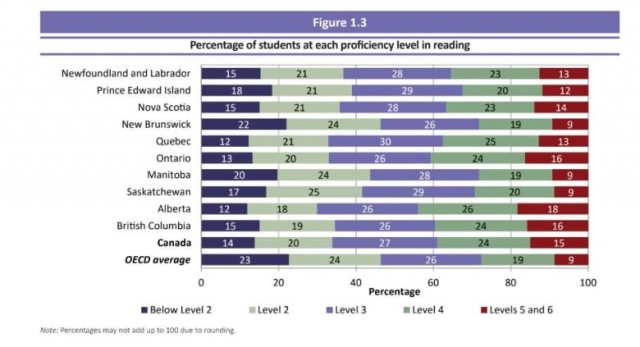
Manitoba performed even worse in math and science.

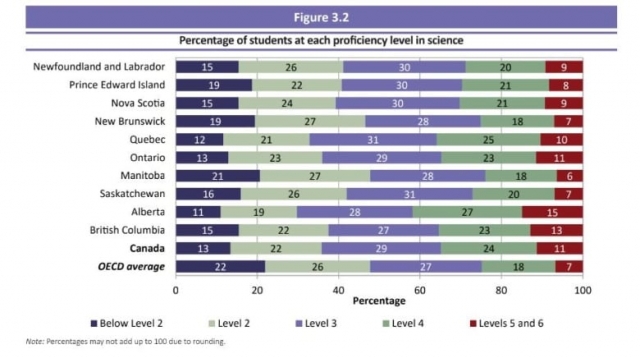
Manitoba had the largest percentage of low achievers in math at 25 percent and in science at 21 percent. The average percentage of low achievers in Canada is 16 percent in math and 13 percent in science. Students in Manitoba are performing below the Organization for Economic Co-operation and Development (OECD) average in both subjects.
The PISA tests were done in April and May of last year and tested almost 3,000 students in the province. Overall 22,000 Canadian students took part in the international test, which is conducted in 79 countries.
The PISA tests are done every three years and are one of two tests that are typically used to compare the skills of Manitoba students to those of their Canadian peers.
- Details
- Contributed by Josh Sigurdson
For the 29th year, the Dauphin RIDE Program is back for the holiday season. If you've taken your vehicle somewhere whether it being a Christmas party or just to your friends and you've had some drinks, the Dauphin RIDE Program is here for you.
"The purpose of the program is to make sure impaired drivers get home safely. That's just not alcohol either, it could be cannabis as well," said Chair person, Cory Lafontaine.
Volunteers will pick you up and drive you home and there will also be another volunteer that will take your vehicle home as well. The program will begin this Friday at 9:00 p.m. It'll also run on Saturday from 9:00 p.m.-3:00 a.m.
The program also runs on December 13, 14, 20, and 21, all from 9:00 p.m.-3:00 a.m. They will also return on New Year's Eve. There is no charge if you need a ride, but you are able to leave tips.
When in operation, the number to call to get a ride is 638-5707.
You can also get in on volunteering. Whether you want to volunteer every night or just one, the Dauphin RIDE Program is always looking.
"We're always looking for good volunteers. If you have some time on your hands, that would be great," concluded Lafontaine.
If you'd like to volunteer or sponsor for the Dauphin RIDE Program, give John a call at 638-7181.
- Details
- Contributed by Darnell Duff
Defence attorneys in the province are considering job action if the government doesn’t increase the amount it pays for legal aid.
The President of the Criminal Defence Lawyers Association of Manitoba, Gerri Wiebe, says that while nothing is set in stone yet, they are looking at everything they can do to try and get the government's attention.
The Government of Manitoba pays a tariff to private defence lawyers who take on cases for people who can’t afford an attorney otherwise. The current rate is set at $80 an hour, which hasn’t been changed in 11 years, while the cost of living in the province has gone up 17 percent in that same time.
The association went on strike in 2008 to have the rate increased to the price it’s at now. Wiebe says that while the association doesn’t want to take a similar course, the government I pushing them in that direction.
Wiebe noted that no lawyer actually takes home $80/hour. An associate at a firm will take home only about 15 percent of that before taxes. If you own the firm, the money goes towards paying everything from other staff salaries and researchers to office equipment and business taxes.
Wiebe says that after all the hours needed to work some cases, lawyers aren’t working for anywhere near the $80/hour rate. As it stands right now, lawyers are required to submit the number of hours they expect to bill for a case to the government before the case.
Wiebe says the overworking results in young, unexperienced lawyers taking on serious cases, impacting the outcome of the case.
The association has been asking the province to increase the rate since 2017 but has been routinely dismissed. They did meet with the previous justice minister, Heather Stefanson, and then in 2018, they sent a list of recommendations to the province outlining what the association was necessary.
The ongoing situation with the defence attorneys isn’t the justice ministry’s only problem right now.
A survey given to Manitoba government employees in late 2018 scored the justice department lower than all other departments.
The survey found that employees of the department feel that they are undervalued, have concerns about leadership in their office, and note a lack of meaningful recognition.
More than 1,400 justice department employees filled out the survey.
- Details
- Contributed by Josh Sigurdson
MNP has announced a merger with Pernarowski Accounting, effective immediately.
Pernarowski Accounting was looking to deliver more specialty services to their clients, and MNP was looking to expand its presence in the region and add more professional resources to serve its clients in the region.
Marion Pernarowski says she is excited about the merger.
“By joining MNP we add more resources, more specialized services and a wider range of experiences, all of which will bring greater value to our clients,” said Pernarowski. “MNP serves a wide range of clients in diverse sectors, including all the key industries we serve and more. This merger is a perfect example of how two firms can come together to give clients the edge they need to stay competitive, overcome challenges and pursue opportunity.
The Pernarowski Accounting team of nine will relocate to MNP’s Dauphin office early this month.
- Details
- Contributed by Josh Sigurdson
December 1st, 1919. That’s when the Marconi Wireless Telegraph Company started the very first radio station in Canada and one of the first around the world.
Guglielmo Marconi is known for his work on early long-distance radio transmissions, Marconi’s Law, and is credited for being the inventor of radio.
That first radio station was XWA, which stood for experimental wireless apparatus, and was based out of Montreal.
While being granted the broadcasting licence in 1919, XWA’s first scheduled broadcast wasn’t until May 1920.
It was also in 1920 that XWA became CFCF, Canada’s First, Canada’s Finest.
It was a very popular radio station for decades in Montreal. However, after 90 years, the station closed in 2010.
In 1922, twenty-three commercial broadcasting station licences got announced.
730 CKDM wouldn’t come to Dauphin until 1951 and started on 1230 KHz with 250 watts before moving to 1050 KHz with 1000 watts in 1956, and then in 1958 CKDM moved to 730 KHz where we have been ever since.
- Details
- Contributed by Isaac Wihak
Last night in Dauphin people lined the streets to watch the Dauphin Christmas Parade of Lights.
Pam Werbiski, chair of the parade, thought there was a great turnout and everything went well.
Werbiski was impressed by the 47 float entries, adding everyone did a fantastic job decorating them.
The float winners from last night were the Knights of Columbus for Christmas Theme Religous, Dauphin's Countryfest for Christmas Theme Organization, the DRCSS Student Council for Christmas Theme Educational, Reit-Syd for Christmas Theme Commercial, and MLA Brad Michaleski for Christmas Theme Individual.
To keep people warm in the -7 weather, there was 8 hot chocolate stations operated by businesses and volunteers.
Werbiski wants to thank everyone.
"A huge thank you to our sponsors and our volunteers, without them we wouldn't have been able to pull it off. Also thank you to everyone that came out to watch the parade. It was great to see so many people out watching."
Werbiski says they'll definitely be back next year for another parade.
- Details
- Contributed by Isaac Wihak
The AGM for Canada’s National Ukrainian Festival was on Wednesday.
While there, Kayla Gillis was re-elected president of CNUF.
“It feels wonderful, this will be my fifth year so I’m looking forward to kicking it off with the 55th anniversary. I thank my board members and everybody who joined on as well. I’m looking forward to a wonderful year.”
Gillis says they talked about the past year, reviewed the finances, and talked about what’s coming up this year.
“This past year was good, it was steady, basically the same as last year’s numbers. We had a bit of a deficit but only about 1300 dollars, but that’s way better than last year’s. We’re slowly moving up and we’ll see what happens.”
Gillis says you can expect some new attractions and old favourites at CNUF this year.
“We are going to be bringing back the pierogi eating contest, the happy hour, we are going to be bringing a few more children’s activities in, and maybe have a volleyball tournament as well.”
Some headliners have been announced. One of the dance headliners will be Yevshan Ukrainian Folk Ensemble, and the three headliner bands will be Millenia, Hloptsi Z Mista, and Sloohai.
Tickets go on sale at 10 am Monday morning and can be purchased at the CNUF office or on their website.
Canada's National Ukrainian Festival takes place July 31st - August 2nd in 2020.
- Details
- Contributed by Isaac Wihak
The annual RCMP Selective Traffic Enforcement Program starts tomorrow, and will continue until New Years Day.
All RCMP Detachments and Traffic Services Units throughout the province will be participating in the program focusing on the detection and apprehension of impaired drivers and other high risk driving behaviours.
Last year, over 11,700 vehicles were checked during 262 checkstops that resulted in 105 people charged with Criminal Code Impaired Driving offences and 30 roadside suspensions.
Five people lost their lives in traffic-related collisions.
- Details
- Contributed by Isaac Wihak






